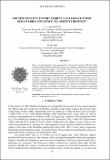Did Nineteenth Century marine vertebrate fossil discoveries influence sea serpent reports?
Abstract
Here we test the hypothesis, first suggested by L. Sprague De Camp in 1968, that “After Mesozoic reptiles became well-known, reports of sea serpents, which until then had tended towards the serpentine, began to describe the monster as more and more resembling a Mesozoic marine reptile like a plesiosaur or a mosasaur.” This statement generates a number of testable specific hypotheses, namely: 1) there was a decline in reports where the body was described as serpent or eel-like; 2) there was an increase in reports with necks (a feature of plesiosaurs) or reports that mentioned plesiosaurs; and 3) there was an increase in mosasaur-like reports. Over the last 200 years, there is indeed evidence of a decline in serpentiform sea serpent reports and an increase in the proportion of reports with necks but there is no evidence for an increase in the proportion of mosasaur-like reports. However, witnesses only began to unequivocally compare sea serpents to prehistoric reptiles in the late nineteenth century, some fifty years after the suggestion was first made by naturalists.
Citation
Paxton , C G M & Naish , D 2019 , ' Did Nineteenth Century marine vertebrate fossil discoveries influence sea serpent reports? ' , Earth Sciences History , vol. 38 , no. 1 , pp. 16-27 . https://doi.org/10.17704/1944-6178-38.1.16
Publication
Earth Sciences History
Status
Peer reviewed
ISSN
0736-623XType
Journal article
Rights
© 2019, History of Earth Sciences Society. This work has been made available online by kind permission of the publisher. This is the final published version of the work, which was originally published at https://doi.org/10.17704/1944-6178-38.1.16
Collections
Items in the St Andrews Research Repository are protected by copyright, with all rights reserved, unless otherwise indicated.

